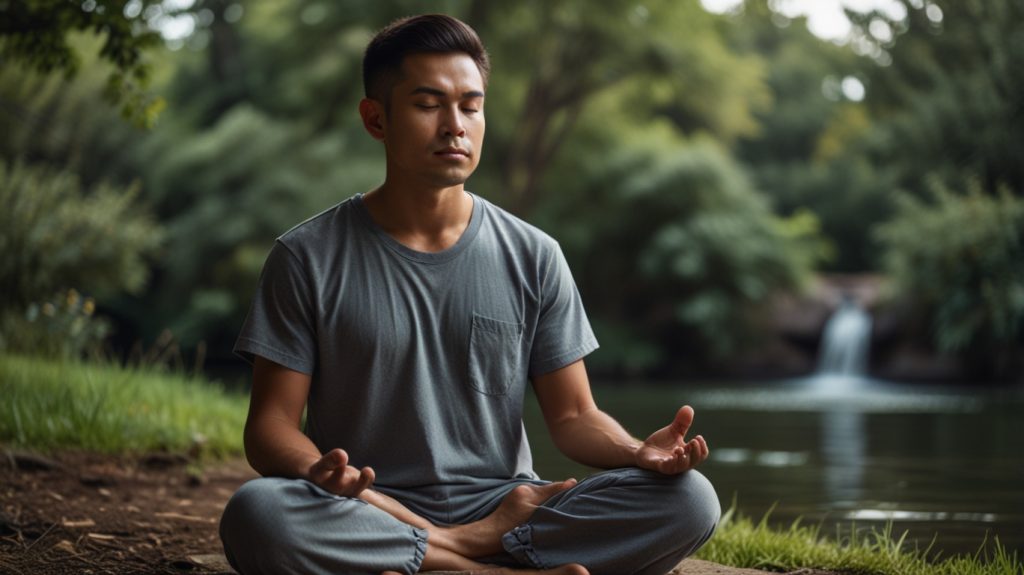In today’s fast-paced world, stress has become a common companion for many. From work pressures to personal responsibilities, the demands of daily life often leave us feeling overwhelmed. Fortunately, meditation offers a time-tested solution to reduce stress and bring balance back into our lives. By practicing meditation, we can develop a greater sense of calm, focus, and inner peace. Here’s how meditation can help reduce stress and how you can get started.
The Connection Between Stress and the Mind

Stress primarily stems from the way our mind perceives and reacts to situations. When we’re stressed, the body enters “fight or flight” mode, triggering the release of stress hormones like cortisol. Over time, chronic stress can lead to mental and physical health issues such as anxiety, depression, heart disease, and sleep disorders.
Meditation works by calming the mind and changing how we react to stress. Through mindfulness and focused breathing, meditation interrupts the body’s stress response, promoting relaxation and helping us regain control over our thoughts and emotions.
How Meditation Reduces Stress

- Promotes Relaxation: One of the main goals of meditation is to shift your mind away from stress-inducing thoughts and bring your attention to the present moment. This mindfulness reduces the body’s stress response, lowers heart rate, and encourages deep breathing, which helps reduce anxiety.
- Improves Focus and Clarity: When we’re stressed, our thoughts often become scattered, making it difficult to focus. Meditation enhances concentration by training the brain to focus on one thing at a time, such as your breath or a mantra. Over time, this improved focus can help you tackle tasks more efficiently, reducing the feeling of being overwhelmed.
- Regulates Emotions: Stress often leads to heightened emotions, such as irritability or frustration. Meditation fosters emotional resilience, allowing you to observe and process your feelings without getting caught up in them. It trains you to respond to challenges with calmness and clarity rather than impulsive reactions.
- Enhances Self-Awareness: Through regular meditation, you develop greater self-awareness and can identify stress triggers early on. This awareness helps you address the root causes of stress rather than just the symptoms, leading to long-term stress management.
- Reduces Physical Tension: Chronic stress often manifests as physical tension in the body, such as tight shoulders or headaches. Meditation encourages relaxation by promoting muscle relaxation and reducing physical discomfort caused by stress.
Types of Meditation to Reduce Stress
- Mindfulness Meditation: This form of meditation involves paying attention to your thoughts, feelings, and sensations without judgment. By staying in the present moment and accepting what arises, mindfulness meditation helps you let go of stressful thoughts and become more aware of the present.
- Focused Meditation: In focused meditation, you concentrate on a single object, sound, or activity, such as your breath, a candle flame, or a soothing sound. By focusing on one thing, you minimize distractions and bring your mind to a state of calm.
- Loving-Kindness Meditation (Metta): This practice involves focusing on cultivating feelings of love and compassion for yourself and others. It helps to replace stress and negative emotions with positive feelings, fostering a sense of connectedness and emotional balance.
- Body Scan Meditation: This technique involves focusing your attention on different parts of your body, starting from your toes and moving up to your head. It’s an effective way to release physical tension caused by stress and promote deep relaxation.
- Guided Meditation: For beginners, guided meditation is a helpful option. In this type of meditation, a teacher or recording guides you through the process. It can include visualizations, breathing exercises, and calming imagery, making it easier to focus and relax.
How to Start a Stress-Relief Meditation Practice

- Find a Quiet Space: Choose a peaceful spot where you won’t be disturbed. It doesn’t need to be elaborate—just a quiet corner where you feel comfortable.
- Sit Comfortably: Sit in a relaxed position with your back straight. You can sit cross-legged on the floor or in a chair with your feet on the ground.
- Focus on Your Breath: Close your eyes and bring your attention to your breathing. Inhale deeply through your nose and exhale slowly through your mouth. Focus on the rhythm of your breath and how your body feels as you breathe.
- Let Thoughts Pass: It’s natural for your mind to wander during meditation. When this happens, gently acknowledge the thought and then return your focus to your breath or chosen point of attention.
- Start Small: Begin with just 5-10 minutes of meditation each day, gradually increasing the duration as you become more comfortable. Even short daily sessions can have a significant impact on reducing stress.
- Be Consistent: The key to reducing stress with meditation is consistency. Make it a part of your daily routine, whether it’s in the morning, during lunch breaks, or before bed.
Benefits of Regular Meditation
With regular practice, meditation not only reduces stress but also enhances your overall well-being. Some of the benefits include:
- Improved sleep: Meditation promotes relaxation, helping you fall asleep more easily and improving the quality of your rest.
- Increased emotional stability: You become better at handling difficult emotions and stressful situations.
- Enhanced concentration: Meditation sharpens your focus, improving productivity and creativity.
- Greater self-compassion: Meditation encourages self-acceptance, allowing you to treat yourself with kindness and patience.
Conclusion
Incorporating meditation into your daily routine can be a powerful tool for managing and reducing stress. By calming the mind, regulating emotions, and fostering self-awareness, meditation helps you navigate life’s challenges with more ease and resilience. Start small, be consistent, and soon you’ll find that meditation not only reduces stress but also enhances your mental and physical health, leading to a more balanced and fulfilling life.

